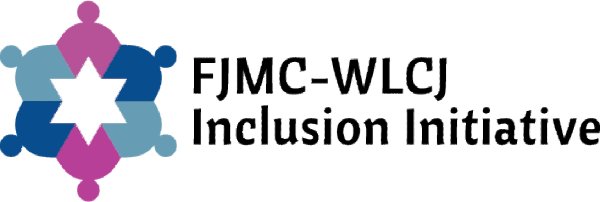
The Federation of Jewish Men’s Clubs (FJMC) and the Women’s League for Conservative Judaism (WLCJ) have worked together over the past year to take action to expand the culture of our synagogues to create an environment that makes all of us, no matter our unique identities and needs, feel welcomed and embraced in our Jewish Community.
The goal of the initiative is that Men’s Clubs, Women’s League Affiliates and synagogues will create an environment that makes all underserved communities feel welcomed and embraced in the Jewish Community. Core targets are the Men’s Clubs, Women’s League Affiliates, clergy and synagogue leaders who we want to support, applaud for their work and encourage to improve their adoption of inclusion practices and policies.
We define “Inclusion” as “the process, practice or policy of providing equal access to opportunities and resources for people who might otherwise be excluded or marginalized; a commitment to welcoming, respecting, accepting, institutionally supporting and valuing diverse identities and communities of people.”
Among the “Underserved Communities” that are the focus of the initiative are:
Working with several other key Jewish organizations, the joint FJMC/WLCJ Committee on Inclusion has developed an Inclusion Resource Guidebook, with a wide range of strategies, activities and programs for local use. The Guidebook can be downloaded here. For more information contact Stephe Sturman.
The Resource Guide is divided into several areas, designed to both successfully introduce inclusion initiatives into your club/sisterhood, plus, important resources to maintain momentum. Remember, it is a guide. The FJMC Keruv initiative would now fall under “Inclusion.” (Past materials on Keruv are now in the Archive on this site.)
To mutually learn through sharing experiences and stories with each other is our next step. We want to hear from you about what your Affiliate Sisterhoods and Men’s Clubs have started in your synagogues. We want to hear about the challenges and successes so that we can learn and share with all our affiliates. As we get your feedback, this will be communicated both on our websites and on-going newsletters.
Click here to visit the FJMC Pride & Prejudice Affinity Group
These lawn sign sets, supplied by FJMC, are free of charge. See them going up at synagogues around North America.
Want a set? Click the form link below, download and email it to Stephe Sturman –.
Need technical or website help? Email us at
Copyright © 2024 Federation of Jewish Men's Clubs. All rights reserved. Website designed by Addicott Web. | Privacy Policy